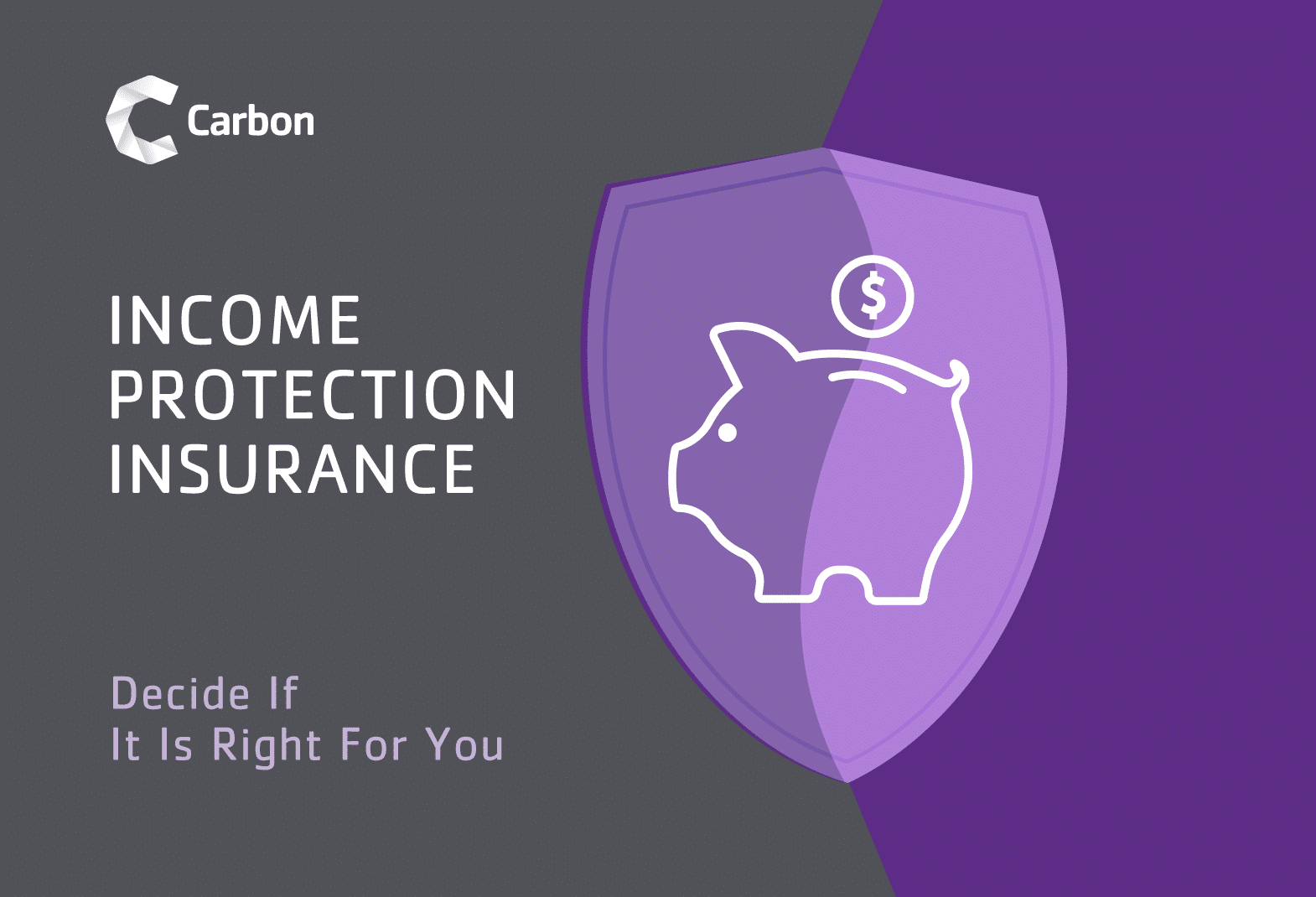Income Protection Insurance provides a financial lifeline when the unexpected occurs. At Carbon, we recognise the pivotal role this insurance plays in ensuring peace of mind and financial stability for working professionals, self-employed individuals and family breadwinners.
In this comprehensive guide, we’ll unravel the intricacies of income protection insurance, illuminating its significance, the scope of coverage, benefits and steps to choose the right policy for your circumstances. While this guide offers a wealth of knowledge from our financial planners, providing tailored advice in navigating through the choices and complexities of income protection insurance.
Table of Contents
- Understanding Income Protection (IP)
- Benefits of Income Protection Insurance
- What does Income Protection Insurance Cover?
- Why is IP Insurance Encouraged for the Self-Employed and Primary Household Earners?
- Tax Benefits of IP Insurance
- Determining Your Coverage Needs and Choosing the Right Policy
- Income Protection Through Super
- Making Claims and FAQs
- Safeguard Yourself Against Financial Unpredictability
Understanding Income Protection (IP)
Income protection (IP) insurance, also known as salary continuance insurance, is a form of coverage designed to provide financial support if you’re unable to work due to illness or injury.
This type of insurance aims to replace lost income, offering policyholders financial security during what is already a difficult time.
Benefits of Income Protection Insurance
Continued Income
One of the primary benefits is receiving a portion of your income (usually up to 70%) when you’re unable to work due to illness or injury. This ensures financial stability, allowing you to cover essential expenses like mortgage or rent, bills, groceries and other day-to-day costs.
Financial Security
This coverage ensures that you have a steady stream of income, allowing you to maintain your lifestyle and meet financial commitments despite being unable to work temporarily.
Customisable Coverage
Having the flexibility to tailor your policy to suit your needs, choosing various options such as waiting periods, benefit periods and the maximum benefit amount, enables individuals to adjust the coverage according to their financial situation. You can discuss these options with our team to avoid overspending on coverage you don’t need, or underestimating what your needs could be.
Tax Deductibility
In Australia, income protection insurance premiums are generally tax-deductible, making it a tax-efficient way to protect your income. This benefit helps reduce the overall cost of the policy.
Support for Self-Employed and Small Business Owners
For self-employed individuals or small business owners who may not have sick leave benefits, income protection can be invaluable. It ensures they continue to receive an income if they’re unable to work due to injury or illness.
Rehabilitation Support
Some income protection policies offer additional benefits like rehabilitation support, covering expenses for rehabilitation services to aid in your recovery and facilitate your return to work – Something to consider when comparing options.
These benefits ensure that policyholders can navigate through tough times with financial stability and support, allowing them to focus on recovery without worrying about their financial obligations.
What does Income Protection Insurance Cover?
Covered:
Temporary Disability
Income protection insurance covers a portion of your income if you’re temporarily unable to work due to illness or injury, providing a financial safety net during your recovery period.
Accident and Sickness
Benefits are usually payable for both accidents and illnesses that prevent you from working, as long as they’re covered by the policy terms and conditions.
Partial Disability
In some cases, policies cover partial disability, allowing you to receive benefits if you can work but at a reduced capacity or hours due to your condition.
Not Covered:
- Pre-Existing Conditions
- Self-Inflicted Injuries
- Pregnancy and Cosmetic Surgery
- Waiting Period
- Work-Related Injuries
- Mental Health Conditions (if it’s a pre-existing condition noted during underwriting, it might not be covered. However, if the condition develops after the policy is in force, it may be claimable)
- Drug or Alcohol Abuse
Why is IP Insurance Encouraged for the Self-Employed and Primary Household Earners?
No Sick Leave or Benefits
Self-employed individuals often lack traditional employment benefits like sick leave or workers’ compensation. If they’re unable to work due to illness or injury, there’s no safety net to cover their lost income.
Financial Stability
For primary earners in a family, their income is essential for meeting mortgage payments, bills, and everyday expenses. Income protection ensures a consistent income stream during periods of incapacity, maintaining financial stability for the household.
Business Continuity
For entrepreneurs and self-employed individuals, their business might heavily rely on their active involvement. Income protection helps bridge financial gaps if they’re unable to work, ensuring the business continues to operate during their absence.
Debt Obligations
Many self-employed individuals have loans or business-related debts that need regular repayments. Income protection ensures they can manage these financial commitments even if they’re unable to work due to unforeseen circumstances.
Peace of Mind
Being self-employed often means having higher responsibilities. Income protection provides peace of mind by acting as a financial safety net, allowing individuals to focus on recovery without worrying about income loss.
Longer Recovery Period
Self-employed individuals might have a longer recovery period, as they may need to get back to full capacity to resume their business activities. Income protection offers support during this extended period of recuperation.
Customised Coverage
Income protection policies can be tailored to suit the specific needs of self-employed individuals, such as considering their business’s nature or income fluctuation, ensuring adequate coverage.
Maintaining Lifestyle
It allows primary earners to maintain their lifestyle and continue supporting their family, covering essential expenses like mortgage or rent, utilities, groceries and children’s education.
Tax Benefits of IP Insurance
Tax-deductible premiums represent a notable benefit associated with income protection insurance in Australia. Here’s a breakdown of this benefit:
Tax Deductions on Premiums
In Australia, income protection insurance premiums are generally tax-deductible. This means the premiums paid for the policy, if held by the individual, can be claimed as a tax deduction reducing the taxable income for the individual.
Lower Tax Liability
By deducting income protection premiums from taxable income, individuals potentially reduce their overall tax liability. This can result in lower taxes, enabling policyholders to retain more of their income.
Considerable Savings
The ability to claim premiums as a tax deduction offers significant financial savings. It effectively lowers the out-of-pocket cost of the insurance, making it a more affordable option for policyholders.
Encourages Uptake of Cover
The tax-deductible nature of premiums encourages more individuals, especially self-employed or high-income earners, to consider income protection insurance. The financial incentive of tax savings prompts them to invest in a protective measure for their income.
Policy Flexibility
- Premiums & Coverage: The ability to claim premiums as tax deductions allows individuals to opt for more comprehensive coverage without significantly impacting their net cost, considering the tax savings.
- Superannuation vs. Personal Holding: Policies can be held either inside superannuation funds, which impacts the tax treatment and type of coverage, or outside super, offering more flexibility and personal tax benefits.
- Waiting and Benefit Periods: Waiting period lengths vary and affect when benefits start, while benefit periods determine how long you’ll receive payments, allowing customisation based on individual financial needs and preferences.
Consultation with Financial Advisors
Individuals are advised to consult with financial advisors or tax professionals to maximise the tax benefits and ensure compliance with tax laws. They can provide guidance on how to optimise the tax advantages within the legal framework.
It’s essential to note that tax laws can be complex and may change over time. Therefore, seeking professional advice from accountants or financial advisors is crucial to understanding how income protection insurance premiums can be claimed as tax deductions and to ensure compliance with relevant tax regulations.
Determining Your Coverage Needs and Choosing the Right Policy
Determining Your Coverage Needs
Selecting the right coverage for income protection goes beyond just choosing a policy. There are key aspects worth considering.
Firstly, Total and Permanent Disability (TPD) coverage provides a lump sum if you face a permanent inability to work. Then there’s trauma insurance, offering a lump-sum payment for critical illnesses. These plans complement income protection, catering to diverse financial needs during challenging times.
Additionally, private health insurance steps in to cover medical expenses, complementing income protection but serving a different purpose.
When considering any of these insurances, don’t overlook the importance of consulting a financial planner! They’re your financial allies, analysing your situation and recommending tailored plans that suit your specific needs.
Together, income protection, TPD, trauma and private health insurance form a comprehensive safety net guarding your financial stability.
Choosing the Right Policy
- The waiting period, when benefits start after the inability to work, and the benefit period, deciding payment duration, should align with financial capabilities and obligations.
- Understanding premium types – Stepped or Level – is vital; while initial costs may differ, long-term implications vary.
- Deciding between these requires thoughtful evaluation of income stability and future growth.
Income Protection Through Super
Understanding income protection through superannuation funds is vital, offering both advantages and limitations.
Super covers life, total and permanent disability (TPD), and income protection insurance. While it provides automatic and cost-effective coverage, limitations like restricted definitions and coverage may impact qualification for benefits. Evaluating existing coverage entails reviewing terms, assessing waiting and benefit periods, and defining disability to ensure adequacy.
Seeking advice from a financial advisor is crucial to compare coverage, assess limitations, and decide whether additional standalone policies are needed for comprehensive protection tailored to individual needs.
Making Claims and FAQs
When making a claim, always follow the steps outlined by your insurer, including notifying them of your claim, completing requisite forms and furnishing essential documentation. Additionally, addressing common FAQs, such as coverage amount inquiries, differences between life and income protection policies, and understanding waiting periods, can provide crucial clarity during the claims process. Familiarity with these procedures and information equips individuals to navigate the claims process effectively, ensuring they receive necessary support during difficult circumstances.
Safeguard Yourself Against Financial Unpredictability
Income Protection Insurance offers more than just security; it serves as a dependable safeguard against financial unpredictability. As you navigate your choices and strive to fortify your financial path, Carbon Group is prepared to offer individualised counsel and support. Our team of financial specialists is dedicated to assisting you in crafting an income protection strategy that precisely fits your distinct requirements, ensuring lasting financial stability for you and your family, regardless of life’s uncertainties.
For professional guidance that gets you and your business moving in the right direction, speak to our team of experts at Carbon. We do more than help you start, we help support your venture into the future.
Check out more of our articles or just give us a call on 1300 454 174 for the answers you seek regarding accounting and tax, bookkeeping, virtual CFO services, financial planning, insurance brokers and finance and lending.






















